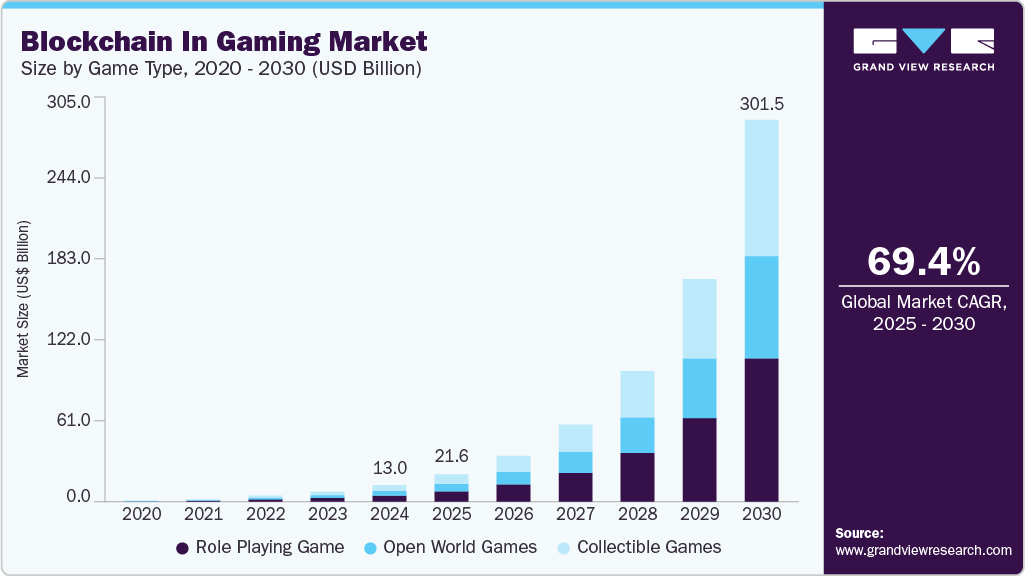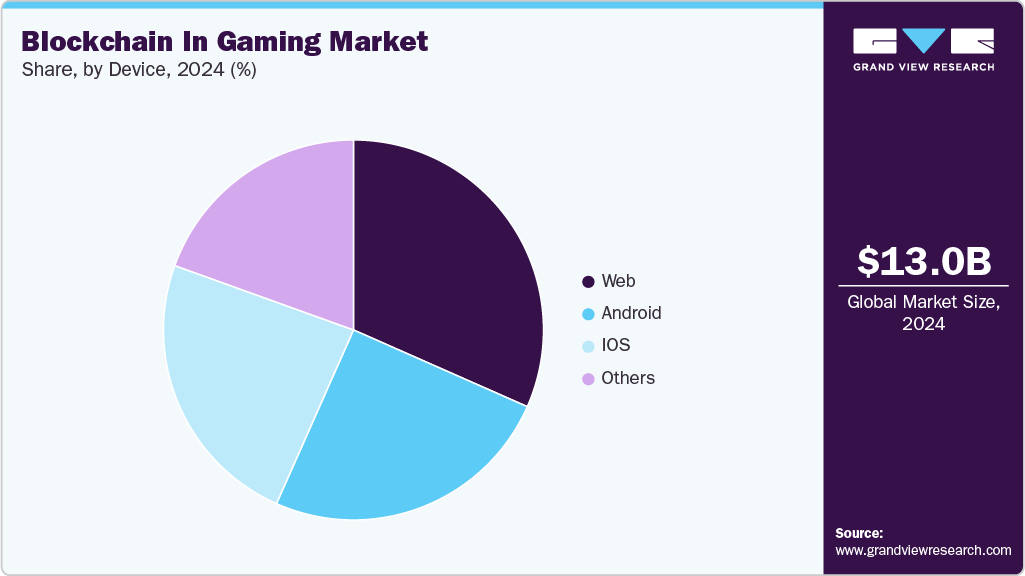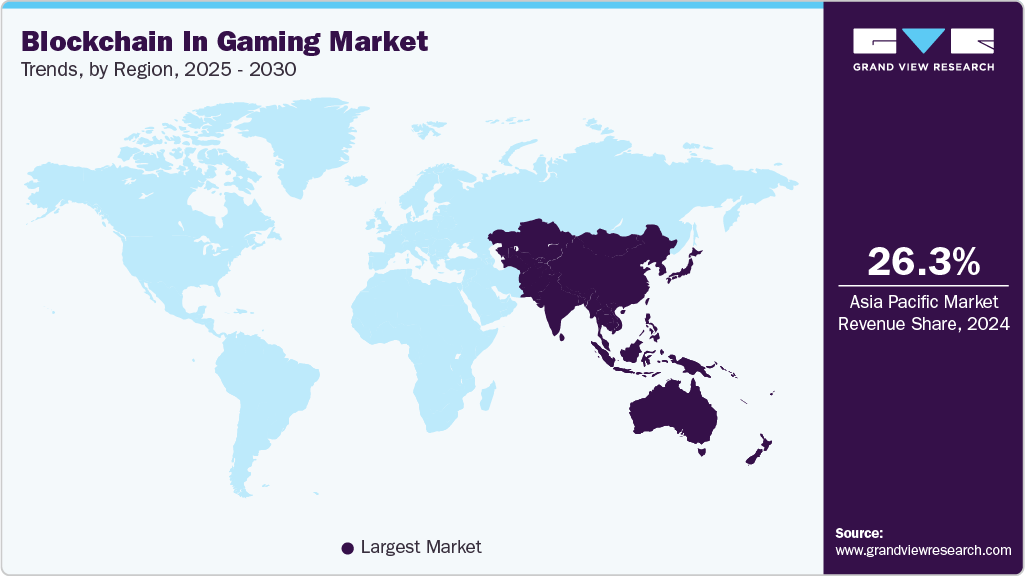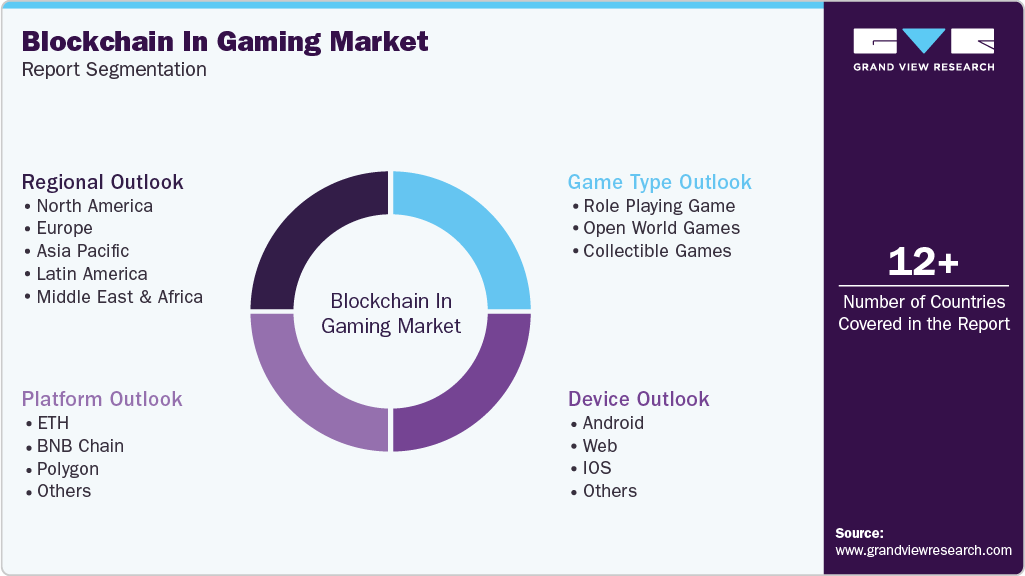- Home
- »
- Next Generation Technologies
- »
-
Blockchain In Gaming Market Size, Industry Report, 2030GVR Report cover
![Blockchain In Gaming Market Size, Share & Trends Report]()
Blockchain In Gaming Market (2025 - 2030) Size, Share & Trends Analysis Report By Game Type (Role Playing Games, Open World Games, Collectible Games), By Platform (ETH, BNB Chain, Polygon), By Device (Android, Web, IOS), By Region, And Segment Forecasts
- Report ID: GVR-4-68040-047-4
- Number of Report Pages: 110
- Format: PDF
- Historical Range: 2018 - 2023
- Forecast Period: 2025 - 2030
- Industry: Technology
- Report Summary
- Table of Contents
- Interactive Charts
- Methodology
- Download FREE Sample
-
Download Sample Report
Blockchain In Gaming Market Summary
The global blockchain in gaming market size was estimated at USD 13.0 billion in 2024 and is projected to reach USD 301.53 billion by 2030, growing at a CAGR of 69.4% from 2025 to 2030. The growth of the blockchain in the gaming industry can be attributed to the need for a secure, transparent, decentralized gaming ecosystem.
Key Market Trends & Insights
- The Asia Pacific blockchain in gaming market held the largest revenue share of 26.35% in 2024.
- The blockchain in gaming market in the U.S. is expected to register significant CAGR over the forecast period.
- By game type, the role-playing game segment accounted for the largest share of 37.1% in 2024.
- On the basis of platform, The ETH segment held the largest revenue share in 2024.
- Based on device, the web segment leads the market with the largest revenue share in 2024.
Market Size & Forecast
- 2024 Market Size: USD 13.0 Billion
- 2030 Projected Market Size: USD 301.53 Billion
- CAGR (2025-2030): 69.4%
- Asia Pacific: Largest market in 2024
Blockchain technology is a digital ledger that is decentralized and distributed, enabling secure transactions and the maintenance of records. It has revolutionized the gaming experience for businesses and players, allowing them to use cryptocurrencies and Non-fungible Tokens (NFTs) to purchase in-game assets. For instance, Axie Infinity is a non-fungible token-based game with millions of players worldwide who use cryptocurrencies based on Ethereum to transact within the game. Blockchain technology enables transparency in the gaming market by providing a public ledger for all transactions. This allows players to track the ownership and transfer of their in-game assets and ensures that all transactions are fair and transparent. It allows players to own their game assets and transactions, allowing them to conduct secure transactions without intermediaries.
In recent years, the blockchain gaming industry has seen a significant rise in investments and funding. This growth is driven by the increasing popularity of blockchain technology, rising demand for decentralized games and assets, and the potential to offer unique gaming experiences and monetization opportunities. In addition, the influx of venture capital and institutional investment into blockchain gaming is a strong signal of market maturity and long-term confidence. Major gaming studios and tech firms are actively investing in or launching blockchain-based games, while Web3-native gaming startups are attracting multi-million-dollar funding rounds, thereby driving market growth.
With artificial intelligence (AI) and machine learning (ML), gaming companies can detect fraudulent behavior and prevent it from occurring in the future. This can include detecting bot accounts or accounts created solely for fraudulent activities. In addition, AI and ML analyze player behavior and preferences and provide a personalized gaming experience, which includes recommending games and in-game rewards that are more likely to appeal to the player. Also, AI and ML can be used to analyze game data and player feedback to identify areas for improvement in game design.
One of the major restraints on market growth is the regulations imposed by various governments. The government plays an important role in the blockchain gaming market by providing support and regulations. For instance, the United States Securities and Exchange Commission (SEC) regulates the use of digital assets, including tokens and cryptocurrencies, within the US. Blockchain gaming companies that use digital assets. These companies are subject to SEC regulations, which include registration and compliance requirements. The Financial Action Task Force (FATF) is an intergovernmental organization that sets standards for anti-money laundering and counter-terrorism financing. The FATF has issued guidance on using virtual assets, including cryptocurrency, which affects how blockchain gaming companies handle financial transactions.
Game Type Insights
The role-playing game segment accounted for the largest share of 37.1% in 2024. This segment's growth can be attributed to their highly immersive and engaging gameplay experience. Role-playing games are known for their deep storylines, character development, and open-world environments, which provide players with a sense of agency and control over their gaming experience. It also offers long-term gameplay elements that encourage players to invest time and resources into the game.
The collectible games segment is expected to grow significantly during the forecast period. Collectible games involve unique digital assets, such as NFTs, which are stored on a blockchain and can be traded or sold securely and transparently. This creates a strong value proposition for players interested in owning and collecting rare or unique digital assets. Moreover, collectible games leverage the scarcity and rarity of digital assets to drive engagement and incentivize players to spend time and money on the game. This is achieved through various gameplay mechanics, such as randomized rewards, limited edition items, and rewards for completing specific achievements or milestones.
Platform Insights
The ETH segment held the largest market share in 2024. This segment's dominance can be attributed to its smart contract functionality that allows developers to create decentralized applications (dApps), including blockchain-based games. These smart contracts enable game developers to create unique gameplay mechanics, store in-game assets on the blockchain, and create decentralized marketplaces for players to trade these assets. For instance, a smart contract could define the rules for a game that are automatically enforced by the blockchain, ensuring fair gameplay.
Polygon is expected to register a significant CAGR during the forecast period. Polygon's low gas prices and transaction fees can be attributed to its use of a Proof of Stake consensus algorithm that reduces network energy consumption and costs. Polygon provides multiple layer two scaling solutions, allowing fast and affordable transactions. This makes it an attractive option for blockchain-based game developers and users looking for a more scalable and cost-effective blockchain solution.
Device Insights
The web segment dominated the market in 2024. Its growth can be attributed to its accessible and user-friendly gaming experience. Players can easily access web-based games through their web browser without downloading or installing any software. This makes it easier for players to get started with blockchain gaming, as they don't need to navigate complex technical requirements.

Android is expected to grow rapidly during the forecast period. The growth can be attributed to its widespread usage, open-source nature, and ease of development. It provides several development tools and resources that make it easier for developers to create and distribute blockchain-based games. For instance, Google Play provides a centralized platform for developers to publish and distribute their games. Android Studio also provides comprehensive tools for developing, testing, and deploying Android applications.
Regional Insights
The North America blockchain in gaming market is expected to grow at a moderate CAGR during the forecast period. The region's growth can be attributed to prominent industry players such as Splinterlands, Uplandme, Inc., Mythical Inc., and ROKO GAME STUDIOS, and its large tech-savvy population. In addition, the regulatory environment in North America is generally favorable towards blockchain technology and cryptocurrencies. This has encouraged the development of blockchain gaming platforms.
U.S. Blockchain in Gaming Market Trends
The blockchain in gaming market in the U.S. held a dominant position in the region in 2024, due to its mature tech ecosystem, strong presence of gaming studios, and robust venture capital activity. American companies such as Mythical Games and Gala Games are pioneering innovative blockchain titles and platforms. Furthermore, the U.S. has a large base of early adopters familiar with crypto and NFTs, accelerating user engagement and monetization. Silicon Valley and other tech hubs also foster continuous innovation in game design, DeFi integration, and digital ownership.
Europe Blockchain in Gaming Market Trends
The blockchain in gaming market in Europe is expected to register a moderate CAGR from 2025 to 2030, owing to its progressive digital policies, strong indie gaming scene, and increasing support for decentralized technologies. The EU’s Markets in Crypto-Assets (MiCA) regulation provides legal clarity for blockchain-based games and NFTs, encouraging startups to innovate confidently. Countries are witnessing the rising adoption of blockchain games, supported by local ecosystems of developers and blockchain incubators.
Germany blockchain in gaming market is expected to register a notable CAGR from 2025 to 2030. Germany is developing into a key European blockchain gaming market, known for its focus on privacy, digital rights, and user ownership values closely aligned with blockchain principles. German developers actively explore blockchain use in player-owned economies, sustainable tokenomics, and open-source game infrastructure, thereby driving the market’s growth.
The blockchain in gaming market in the UK held a substantial market share in 2024, driven by its strong fintech ecosystem, government initiatives around digital assets, and a vibrant community of game developers. London, in particular, is home to several blockchain startups and NFT gaming platforms. The country's regulatory landscape, while evolving, is relatively open to innovation, especially with the government exploring frameworks for digital asset integration.
Asia Pacific Blockchain in Gaming Market Trends
The blockchain in gaming market in Asia Pacific is expected to grow at a CAGR of 70.5% during the forecast period. The growth can be attributed to the growing interest in cryptocurrency and high internet and mobile penetration. There is an increasing interest in cryptocurrency among consumers and investors in the Asia Pacific region, resulting in a growing participation in the cryptocurrency market. This creates a favorable environment for blockchain gaming, which utilizes cryptocurrency and other digital assets. For instance, in January 2023, Asia Blockchain Gaming Alliance (ABGA), a non-profit organization focusing on blockchain technology in the gaming industry, launched a USD 45 million eco fund. The eco fund would be dedicated to supporting and enhancing the development of game developers and companies.

India's blockchain gaming market is expected to grow moderately during the forecast period. The market is fueled by its massive mobile-first gamer population and a rapidly expanding crypto-aware youth demographic. Affordable smartphones, cheap data, and increasing interest in Play-to-Earn (P2E) models are key drivers. In addition, local developers are actively creating Web3 games catering to domestic and global audiences, thereby driving market growth in the country.
The blockchain in gaming market in Japan held a substantial market share in 2024. Japan presents a uniquely favorable environment for blockchain gaming due to its long-standing cultural acceptance of virtual economies, digital collectibles, and character-based IP. The country has a mature gaming market with highly engaged users who are comfortable with in-game purchases and digital ownership, key components of blockchain-based games.
Key Blockchain In Gaming Company Insights
Some key companies in the blockchain in gaming industry include Animoca Brands Corporation Limited, Sky Mavis, and Dapper Labs, Inc., among others. Blockchain-based game providers are increasingly developing games that can interact with one another, allowing players to use assets from one game in another, creating a connected and dynamic gaming ecosystem. This ecosystem enables players to move seamlessly between different games and experiences. In addition, with the rise of Non-fungible Tokens (NFTs), many blockchain game providers are developing their own NFT marketplaces, where players can buy, sell, and trade assets in-game. This creates a secondary market for players to monetize their in-game assets and provides a new revenue stream for blockchain-based game developers.
-
Animoca Brands, headquartered in Hong Kong, is a prominent company in blockchain-based gaming and digital entertainment. The company operates an extensive international network with offices and subsidiaries in the U.S., Canada, Germany, France, South Korea, Australia, Argentina, and the Czech Republic. Known for its innovative approach to Web3 and digital property rights, Animoca Brands has developed and invested in a diverse portfolio of blockchain projects and games. Some of its principal products include The Sandbox, Moca Network, Anichess, Open Campus, HeyAni, GAMEE, WATBird, TinyTap, Phantom Galaxies, and Crazy Defense Heroes.
-
Sky Mavis is a Singapore-based technology company focused on decentralized applications and services, particularly in the blockchain and gaming sectors. The company is best known for developing Axie Infinity, a blockchain-based game that allows players to own their digital assets and earn rewards.
Key Blockchain In Gaming Companies:
The following are the leading companies in the blockchain in gaming market. These companies collectively hold the largest market share and dictate industry trends.
- Dapper Labs, Inc.
- Sky Mavis
- Splinterlands
- Animoca Brands Corporation Limited
- Immutable
- Uplandme, Inc.
- Illuvium
- Mythical Inc.
- ROKO GAME STUDIOS
- Autonomous Worlds Ltd.
Recent Developments
-
In May 2025, Pudgy Penguins announced the launch of Pengu Clash, a blockchain-based multiplayer skill game debuting on the TON blockchain. This fast-paced title provides fans with a fresh, interactive way to engage with the Pudgy Penguins IP, which now connects with over 1 billion users through Telegram.
Blockchain In Gaming Market Report Scope
Report Attribute
Details
Market size value in 2025
USD 21.59 billion
Revenue forecast in 2030
USD 301.53 billion
Growth rate
CAGR of 69.4% from 2025 to 2030
Base year for estimation
2024
Historical data
2018 - 2023
Forecast period
2025 - 2030
Quantitative units
Revenue in USD million/billion, and CAGR from 2025 to 2030
Report coverage
Revenue forecast, company ranking, competitive landscape, growth factors, and trends
Segments covered
Game type, platform, device, region
Regional scope
North America; Europe; Asia Pacific; Latin America; MEA
Country scope
U.S.; Canada; Mexico; Germany; UK; France; Singapore; Japan; India; South Korea; Australia; Brazil; KSA; UAE; South Africa
Key companies profiled
Dapper Labs, Inc.; Sky Mavis; Splinterlands; Animoca Brands Corporation Limited; Immutable; Uplandme, Inc.; Illuvium; Mythical Inc.; ROKO GAME STUDIOS; Autonomous Worlds Ltd.
Customization scope
Free report customization (equivalent up to 8 analysts working days) with purchase. Addition or alteration to country, regional & segment scope.
Pricing and purchase options
Avail customized purchase options to meet your exact research needs. Explore purchase options
Global Blockchain In Gaming Market Report Segmentation
This report forecasts revenue growth at the global, regional, and country levels and provides an analysis of the latest industry trends in each of the sub-segments from 2018 to 2030. For this study, Grand View Research has segmented the global blockchain in gaming market report based on game type, platform, device, and region:

-
Game Type Outlook (Revenue, USD Million, 2018 - 2030)
-
Role Playing Game
-
Open World Games
-
Collectible Games
-
-
Platform Outlook (Revenue, USD Million, 2018 - 2030)
-
ETH
-
BNB Chain
-
Polygon
-
Others
-
-
Device Outlook (Revenue, USD Million, 2018 - 2030)
-
Android
-
Web
-
IOS
-
Others
-
-
Regional Outlook (Revenue, USD Million, 2018 - 2030)
-
North America
-
U.S.
-
Canada
-
Mexico
-
-
Europe
-
Germany
-
UK
-
France
-
Asia Pacific
-
-
Singapore
-
Japan
-
India
-
South Korea
-
Australia
-
-
Latin America
-
Brazil
-
-
Middle East and Africa (MEA)
-
KSA
-
UAE
-
South Africa
-
-
Frequently Asked Questions About This Report
b. The global blockchain in gaming market size was estimated at USD 13.00 billion in 2024 and is expected to reach USD 21.59 billion in 2025.
b. The global blockchain in gaming market is expected to grow at a compound annual growth rate of 69.4% from 2025 to 2030 to reach USD 301.53 billion by 2030.
b. The role-playing game segment accounted for the largest share of 37.1% in 2024. The segment's growth can be attributed to the highly immersive and engaging gameplay experience they offer.
b. Some key players operating in the blockchain in gaming market include Dapper Labs, Inc., Sky Mavis, Splinterlands, Animoca Brands Corporation Limited, Immutable, Uplandme, Inc., Illuvium, Mythical Inc., ROKO GAME STUDIOS, and Autonomous Worlds Ltd.
b. The growth of the blockchain in gaming industry can be attributed to the need for a secure, transparent, and decentralized gaming ecosystem.
Share this report with your colleague or friend.
Need a Tailored Report?
Customize this report to your needs — add regions, segments, or data points, with 20% free customization.

ISO 9001:2015 & 27001:2022 Certified
We are GDPR and CCPA compliant! Your transaction & personal information is safe and secure. For more details, please read our privacy policy.
Trusted market insights - try a free sample
See how our reports are structured and why industry leaders rely on Grand View Research. Get a free sample or ask us to tailor this report to your needs.










